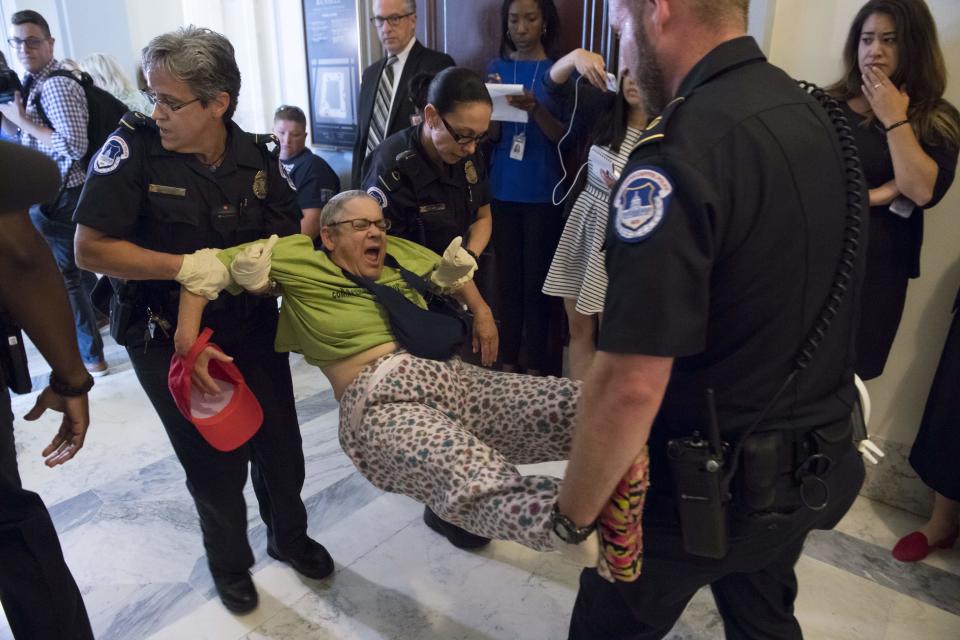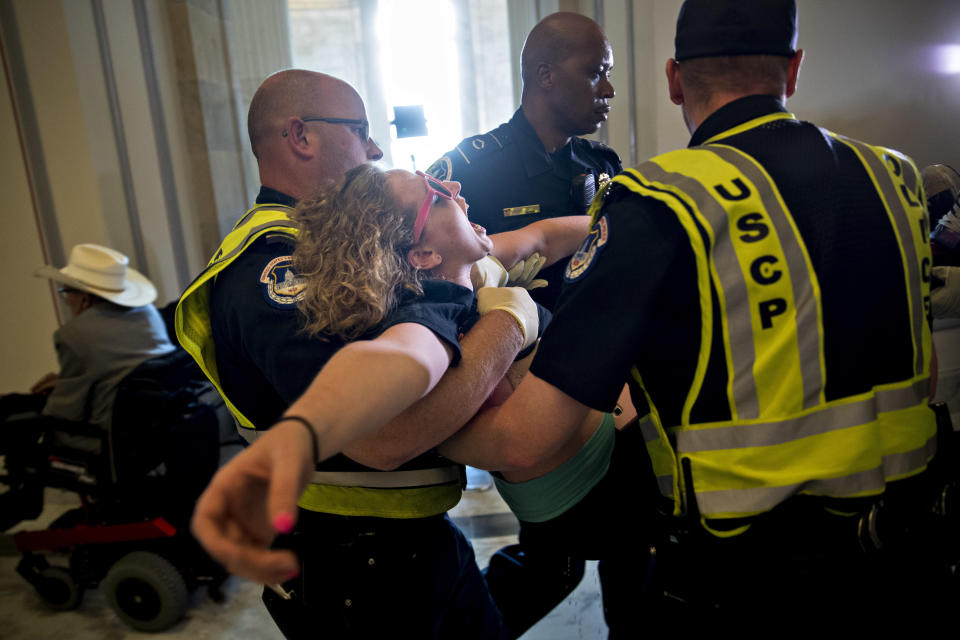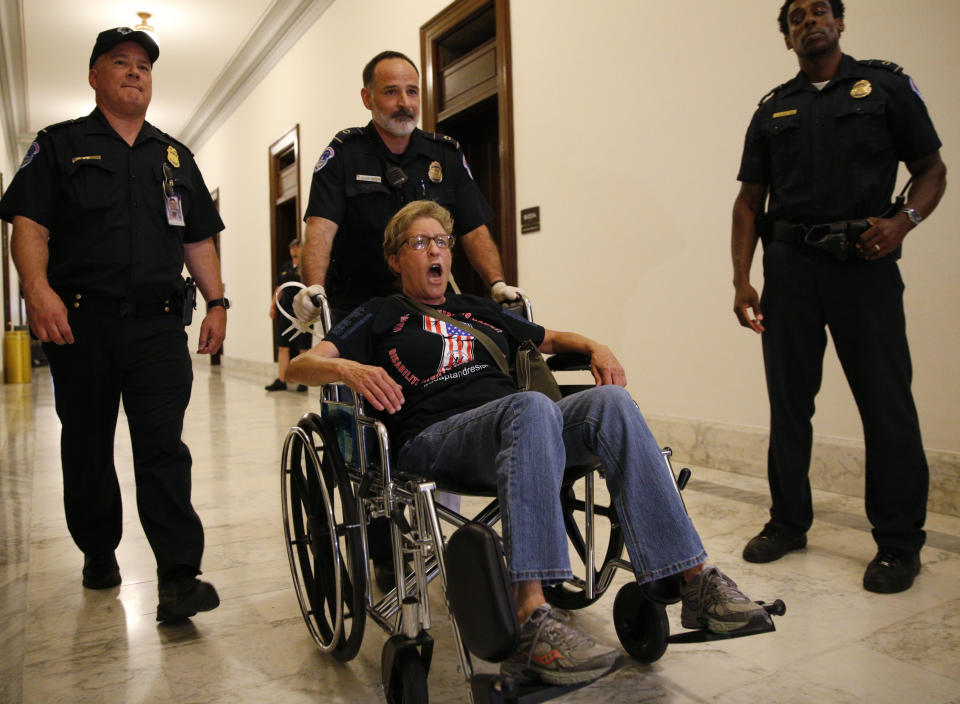The GOP Congress Is Rushing Wildly Ahead With A Huge Health Care Bill. Again.
Here we go again.
For what feels like the 1,000th time this year, the Republican Senate is looking to ram through a hugely consequential health care bill to repeal the Affordable Care Act and “replace” it with ... a lot less.
The GOP Congress only has until Sept. 30 to advance health care legislation with a bare majority in the Senate, because that is when the special procedural rules enabling them to avoid a Democratic filibuster expire. That deadline seems to be motivating Republicans to line up behind a bill sponsored by Republican Sens. Bill Cassidy (La.) and Lindsey Graham (S.C.). This could mean a vote next week.
That’s despite the fact that this legislation has never been the subject of a public debate or the normal congressional committee process. The Congressional Budget Office also won’t have time to analyze how many people would have health insurance as a result of the bill, or how much the premiums would cost.
In other words, Congress would be passing a bill with major ramifications for many millions of people without first finding out exactly what it does.
And because the Senate has weird rules, the Cassidy-Graham legislation could go straight to a vote after just two minutes of debate or less. Yes, two minutes ― that’s not a typo.
If the stakes weren’t so high and the weren’t politics so cynical, it might be amusing to watch Senate Republicans act out the old saying that the definition of insanity is doing the same thing over and over again and expecting different results.
Could they really get a different result? It’s possible. There’s been a lot of noise in the past week about how Cassidy and Graham almost have the votes and just need to flip one or two of the holdouts from last time. (They only need 50 votes because Vice President Mike Pence can cast a tie-breaking vote in his constitutional capacity as president of the Senate.)
Cassidy and Graham have been buttonholing their colleagues for months and have exuded such confidence in public that they have, at the very least, convinced the Washington press corps that the repeal is very, very close. They’ve also managed to persuade Senate Majority Leader Mitch McConnell (R-Ky.) and President Donald Trump to lend a hand after a period in which McConnell especially didn’t want to be anywhere near the health care issue. At a minimum, Cassidy and Graham have created the perception that they have momentum.
All of this has got Republicans pretty excited and has spurred Senate Democrats and liberal activists to reactivate their opposition campaign. That’s all perfectly logical, and if Democrats aren’t going to fight to preserve the safety net, what are they going to fight for?
But a note of skepticism about this bill’s chances is also appropriate. Cassidy and Graham have been bragging about how close they are, about how they have 45 to 49 of the 52 Republicans in the Senate locked down ― but that’s not really much of an accomplishment. As the previous Senate action on health care this year demonstrated, almost all GOP senators will apparently vote in favor of anything they could plausibly describe as “Obamacare repeal.”
But that’s a big “almost.” In the end, being one vote short is the same as being 49 votes short. Zealous repeal advocates have failed time and again to convince enough of their colleagues that kicking millions of people off their health insurance is the right move, especially when they’re trying to do it so fast that lawmakers and the American public don’t have time to understand what the legislation does. (At least this bill wasn’t introduced mere hours before a Senate vote, like McConnell’s was.)
The Cassidy-Graham bill would slash federal spending on health care programs over the coming decade, which will mean millions fewer people with health coverage. It would also gut the Affordable Care Act’s consumer protections ― including its guarantee of coverage for people with pre-existing conditions ― by allowing states to set them aside.
The measure essentially takes the pots of money currently financing Medicaid and subsidies for private health insurance, shrinks them and distributes what’s left to the states in the form of block grants. Every state would then essentially have to come up with its own new health care system.
If any of that sounds familiar, it’s because we just lived through several rounds of this over the summer, culminating in a fiery crash on the Senate floor in July when GOP Sens. Susan Collins (Maine), John McCain (Ariz.) and Lisa Murkowski (Alaska) voted against McConnell’s repeal proposal. (It’s worth noting that the final attempt at Obamacare repeal this summer was on a placeholder bill senators were assured would never become law. Other, more substantial bills also failed before that one.)
Cassidy-Graham hasn’t resolved any of the substantive or procedural objections that led that trio of Republican senators to oppose the last health care bill.
Like now, Senate Republicans wanted to move swiftly and with little debate on legislation that would affect millions of lives for years to come. Trump and the GOP have promised to repeal Obamacare so many times, they really want to say they delivered. But they also don’t really want anyone to notice them stripping millions of low- and middle-income families of their health insurance or eliminating popular policies like the promise of coverage to people regardless of their health status or medical histories.
McCain has been coy about where he stands on the Cassidy-Graham bill.
He’s said he supports the concept behind it but wants to see the Senate move health care through the regular committee and floor channels and to consider amendments to the legislation from Republicans and Democrats. The hurried and secretive process used to bring health care measures to the Senate floor this summer, McCain said at the time, was the main reason he shocked his party and opposed the final bill. If McCain turns around and votes for Cassidy-Graham without those things ― especially without a CBO score ― it would obliterate that previous attempt at statesmanship.
McCain’s also said the views of Arizona Gov. Doug Ducey (R) are key to him, and Ducey has endorsed the bill. Of course, Ducey endorsed the last Senate GOP health care bill, too, and McCain voted against it.
Collins and Murkowski haven’t said how they’d vote, either. Both senators objected to the previous bills’ steep cuts to Medicaid, among other things, and Cassidy-Graham also slashes the budget for that program. Arguably more significantly, Collins and Murkowski oppose eliminating federal funding for Planned Parenthood, which this bill would do.
And then there’s Sen. Rand Paul (R-Ky.), who never likes it when anyone is standing to his right. He has recently been 100 percent crystal-clear that he won’t vote for Cassidy-Graham, which he dubbed “Obamacare Lite.” Maybe he’ll flip; Paul hates Obamacare a lot, and might not want to be the vote that kills repeal. But that would be quite a shift.
And then there’s the House. It’s not crazy to imagine that a legislative body that threw a party on the White House lawn after passing a bill to shrink the number of Americans with health insurance by 23 million wouldn’t let a rushed process get in the way of doing it again. And if Cassidy-Graham really is the last shot at dismantling the Affordable Care Act, all the more reason for House Speaker Paul Ryan (R-Wis.) to go along with it.
At the same time, the House barely passed its version of Obamacare repeal after months in infighting between different wings of the party, and the lawmakers who make up the House Republican Conference haven’t suddenly stopped disagreeing with each other since May.
Put all of that together and it amounts to a great number of questions about Cassidy-Graham’s prospects, and just 12 days to answer them.
Also on HuffPost











Love HuffPost? Become a founding member of HuffPost Plus today.
This article originally appeared on HuffPost.

